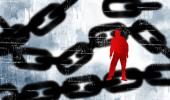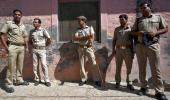'Their role model is Iran: high control of the citizens by the State.'
'In Iran it is Islamic control; in India, it will be Hindutva control.'

To understand how Opposition MPs would have argued against the new law bills introduced in Parliament last week by the Narendra D Modi government had they not been suspended from the House, Prasanna D Zore/Rediff.com spoke to Karti Chidambaram, the Congress MP from Sivaganga, who was all set to participate in the debate that would have ensued in the Lok Sabha had 146 Opposition MPs from the Lok Sabha and Rajya Sabha not been suspended.
I wanted to speak against these bills, but then the government systematically purged the two Houses of Opposition MPs so that there is no voice of dissent that could go on record.
The government passed the three bills and made into a law without any intervention from the Opposition.
First and foremost, this is not some decolonisation effort at all. In fact, it makes it far more draconian (than the colonial laws) and makes the Indian State a bigger police State.
Secondly, there is no decolonisation because 90 per cent of the old bill is retained here. What have you decolonised? You've not decoloniSed any law.
In fact, the home minister (Amit Anilchandra Shah) must list out what he has decolonised.
What is colonial?
Colonial is the intent of the State to control the people and to suppress the people. Every tool which the British used to suppress the Indians then is still available in this thing (the Bharatiya Nyaya Sanhita) to control and suppress the population today.
So what is decolonised about it? Nothing is decolonised about it.
The BNS gives extraordinary powers to the police. You are giving them 60 days to 90 days of police custody as opposed to 50 days and 15 days. And you have diluted the D K Basu judgment which provided for so many safeguards like everyday medical checkup, making sure custodial torture is not happening and everything.
The D K Basu judgment has been very badly diluted.
The third most atrocious part of the BNS is that you have renumbered all the sections which means it's going to be complete confusion.
Today, everybody knows (Indian Penal Code Section) 302 is a murder, (IPC Section) 420 is cheating, but that's not the case (with the BNS).
We will have to take huge efforts to educate the police, the bureaucracy, the judicial service, the lawyers, the judges so that everybody gets familiar with the sections. Look at the kind of gridlock it will create.
Suppose the law is notified today -- I assume the law will be notified before January 1 -- so anything you file today (on December 26) will be in the IPC. Anything you file after that notification after January 1 will be the BNS.
And then how does the court look at everything (the combination of the sections under the IPC and BNS)? How does the court look at one thing or the other? One will be in one section (say, under the IPC), other will be in one section (of the BNS).
You say you have charged somebody with (section) 420 (of the IPC) but the 420 is not there (in the BNS, section 420 doesn't deal with cheating). So the renumbering (of sections in the new BNS for crimes that have had different numbering in the IPC) is going to create so much confusion.
It's exactly the same provision, word to word (of the IPC), but a completely different number here (in the BNS).
All the legal precedents which have evolved around the IPC for the last 159 years might not hold good now. You have to now evolve new precedents; so everything will get agitated.
Our criminal laws have evolved over a period of time and practitioners of criminal and civil law know it. Now that precedence will be thrown out the window.
In fact, I see a plethora of cases going up to the Supreme Court asking for the interpretation of the law itself. It's going to create a gridlock.
Think about it. You file a petition today (before the BNS is notified), you will file it under the IPC, but if you file it in January, after January 1, you will file (it under some sections) in the BNS.
How do you read both (sections under the IPC and BNS in conjunction)?
Under what rules will the trial take place? What (evidence) will be admissible, what will not be admissible before.
If the government wanted to amend certain sections, they could have amended certain sections. Instead of that they (the Narendra Damodardas Modi government) undertook a complete renumbering exercise.
I'll tell you exactly how it's akin to: Suppose you have traffic lights -- red, yellow, amber and green. The colours will remain the same (in both the IPC and BNS).
But we say red is now (under the BNS) wait, green is stop and yellow is go. So what will happen? The same colour, but everybody will get confused. This is what is going to happen.
Yes, there are certain things I welcome.
In fact, they have not criminalised adultery (homosexuality, etc) and all those kind of things. Some of these fellows (belonging to the hardline Hindutva factions) were all suggesting (criminalisation of adultery, homosexuality, live-in relationships), all that has not been done.
They removed the word sedition, but it's come back in another form.
Now, you have added economic security (to national security, etc).
Suppose a big economist says the Indian rupee is weak. Does it endanger India's economic security?
Some other big Indian economist says, I think the Indian rupee is overvalued. Suppose someone says this today and tomorrow the market takes that into account tomorrow morning and the Indian rupee falls against the US dollar? Will this endanger India's economic security and will this economist be arrested because of that?
Given the way they have worded and framed the BNS the civil liberties of Indian citizens will be under grave threat from here on.
With the new Telecommunication Act, everything can be intercepted. They (the government) want even encrypted messaging to be given a back end. I don't know how those companies will give it because you can't decrypt the messages only in India, and not (allow the governments of other countries to) decrypt them anywhere in the world. Their entire business model collapses.
You can't say in India, I'll have a backend, but I won't have a backend (in the US, or the UK, or any other country where democratic and civil rights of people and their privacy is protected by law). It doesn't work like that.
This is going to be a police State and a police State always creates chaos.
I always maintain the BJP's model of governance is to make India into a Hindutva Iran. That is their model of governance.
Their role model is Iran: High control of the citizens by the State. In Iran it is Islamic control; in India, it will be Hindutva control.
This is what Karti Chidambaram posted on X:










